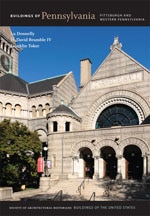You are here
Lafayette Apartments (Butler County National Bank)
Built as the Butler County National Bank, this Renaissance Revival six-story, steel-frame, red brick building was designed by a New York City firm. Advertised for years as “The Big Bank by the Court House,” it accommodated a bank and post office on the first story, and offices for oil and gas companies above. Late in the twentieth century, the building housed county offices before being converted into apartments. The rounded corner entrance framed by columns and an architrave is the focal point of the first story. This corner building's two facades are enriched with limestone detailing, including prominent voussoirs and cartouches over the first-story windows and pediments above the second-story windows. Pressed-copper spandrels and limestone surrounds delineate each bay on the upper stories, and a full copper cornice supported by elaborate brackets crowns the building. Unfortunately, the interior has lost most of its mahogany, bronze, and marble in two major remodelings. The architects also designed the National City Bank (former Butler Savings and Trust Company, 1925–1926; S. Main Street at W. Jefferson Street). This sleek, eight-story limestone building features eleven grotesques at the base of the V-shaped pilasters, which provide an unexpected note of lightheartedness in the otherwise fairly somber bank.
Writing Credits
If SAH Archipedia has been useful to you, please consider supporting it.
SAH Archipedia tells the story of the United States through its buildings, landscapes, and cities. This freely available resource empowers the public with authoritative knowledge that deepens their understanding and appreciation of the built environment. But the Society of Architectural Historians, which created SAH Archipedia with University of Virginia Press, needs your support to maintain the high-caliber research, writing, photography, cartography, editing, design, and programming that make SAH Archipedia a trusted online resource available to all who value the history of place, heritage tourism, and learning.







